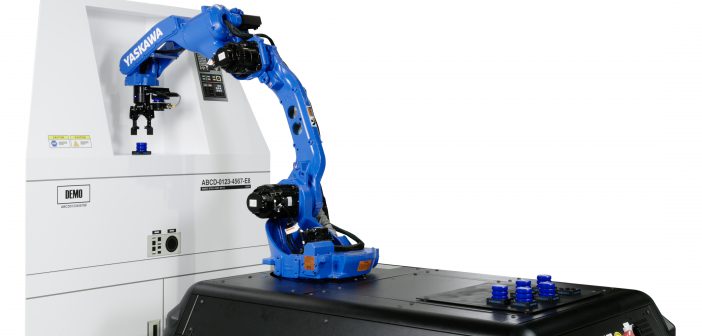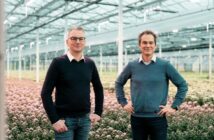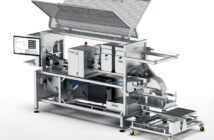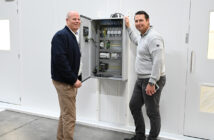Yaskawa is exploring the possibility of moving to the new Brainport Industries Campus in order to contribute to the chain of the Factory of the Future and the industrial automation which is its central feature. ‘We see opportunities in the market for robotics. However, we cannot realise them alone, we need other parties to develop and market new automation solutions.’

Advanced vision enables the new generation of robots from Yaskawa, the Motoman, GP series, to recognise biscuits for example, increasing their adaptive capacity.

Eddie Mennen, Managing Director of Yaskawa Benelux
Crossovers within field labs promote innovation
As a major international player in the field of industrial automation, Yaskawa is a crucial piece of the jigsaw for an initiative like the Brainport Industries Campus (BIC) in Eindhoven. BIC’s distinguishing characteristic is co-development, says Eddie Mennen, Managing Director of Yaskawa Benelux in Son. ‘Industrial automation is a buzzword that every politician in The Hague is talking about. We don’t just want to develop smart products in Japan, our strength also lies in developing new applications for robots. For this reason, we want to do some joint development, thinking and acting locally as a global player.’
Ecosystem
Yaskawa uses its own roadmap, Vision 2025, to identify which technologies the company considers important and what it wants to have achieved in eight years’ time. The three priorities are mechatronics (robotics, motion and operating systems), sustainability (smart electric drive systems to save energy) and humatronics (bringing technology to people – for example, Yaskawa is participating in the development of exoskeletons and invests in care robots). ‘We can deliver the technology, but making the business case is still difficult. There is also still a really big gap between technology and practice. Because how do you teach a robot to put compression stockings on someone? Aging is also an issue in Japan, hence our interest in this domain.’
Hands-on
That long-term vision is typically Japanese, says Mennen. ‘As such, we have invested heavily in technology in recent years. That takes time; smart industry requires medium-term thinking. It can take five to ten years before new technologies are ready for the market. This is why an initiative like BIC is very valuable. It builds up an ecosystem in which companies work together systematically – rather than looking to earn money right away, because that is not always possible.’ In terms of budgets for smart industry (or Industry 4.0 as the Germans like to call it), the Netherlands cannot match its eastern neighbours, says Mennen. ‘Look at German industrial policy, which attracts billions. We cannot compete with that with just the occasional million-euro investment from the government. Which is why the BIC model – a hands-on approach, with an industrial environment in addition to field labs – really appeals to us and we are happy to supply engineers and materials for it. Thinking about where we want to get to with a number of chain partners, working on a product together, with an end user who acts as a launching customer’, he says. ‘The fact that everyone is on the same site makes it easy to meet. Because it’s not just about smart technology, it’s also about working together in smart ways.’
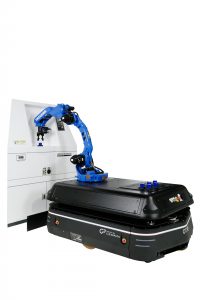
Yaskawa already has the technology for mobile robots in-house. Photos: Yaskawa
Adaptive systems
Yaskawa is particularly interested in the Flexible Manufacturing field lab: 24/7 operation, series size 1 and fully automated. ‘The field lab plays the lead role in the development process – from the lab, new concepts go to the factory for testing, etc. That requires adaptive systems that can react at series 1, smart artificial intelligence that can respond and correct itself with the help of databases. As a result, there is a cross-over with the field lab in this area for software, where systems learn to configure and programme themselves.’
Another important partnership Mennen can see happening within BIC relates to vision. ‘We need our robots to have eyes, there’s still a lot of work to be done in this area. With 3D vision, we hope to increase robots’ flexibility. The idea is that this will lead to shorter changeover times and little downtime – those are the drivers.’ Finally, Yaskawa also sees potential in the smart logistics technology cluster, another priority area at BIC. ‘Take mobile robots which are not limited to one fixed location but can move around and perform tasks all over the place. We already have that robot technology in-house.’
Shared facility
Mennen cites the arrival of the educational institute Teclab at BIC as an important development. ‘We have plenty of orders, the biggest threat at the moment is the shortage of good people. Educational institutions cannot keep up with developments and you can hardly blame them. It is therefore a good thing for companies to be active in this area themselves. We need people at intermediate vocational (mbo) level who have practical knowledge. Because if you have never welded yourself, you’ll never be able to programme a welding robot properly.’ Yaskawa is a partner in Teclab; the company has already supplied a handling robot and recently also installed a welding robot. ‘It is a shared facility, designed for students and for bringing businesses up to speed on new developments. And we can use those robots ourselves for tests, training and demos.’
Yaskawa is seriously considering moving to BIC in early 2019, when its current lease at the Ekkersrijt industrial estate in Eindhoven expires. The importance of BIC is obvious to Mennen. ‘We see opportunities in the market for robotics. However, we cannot realise them alone, we need other parties in order to market new products. Training is very important for unlocking the market for new applications, getting young people enthusiastic about technology’, he says. ‘Yaskawa is posting double-digit growth, we need new people ourselves and for our customers in order to use all that great technology.’

